人教版英语必修3unit2 Healthy eating 情态动词课件(共40张PPT)
文档属性
| 名称 | 人教版英语必修3unit2 Healthy eating 情态动词课件(共40张PPT) |
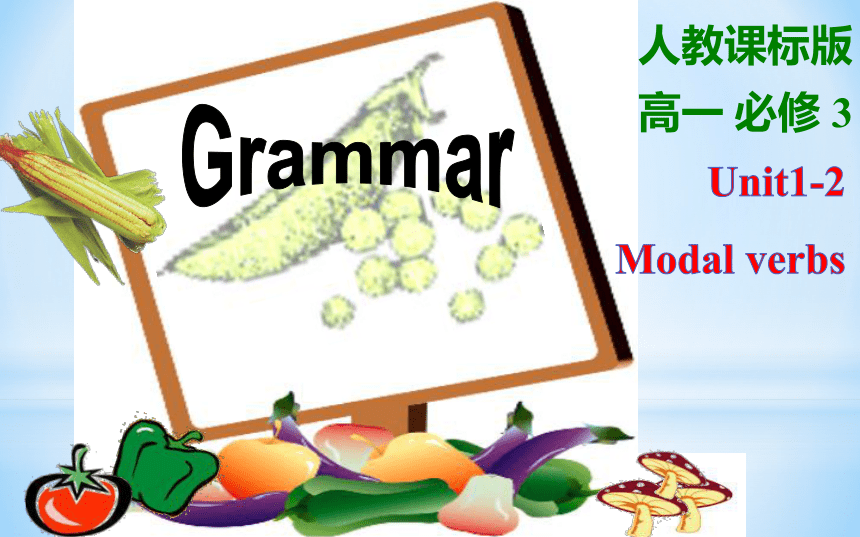
|
|
| 格式 | zip | ||
| 文件大小 | 3.3MB | ||
| 资源类型 | 教案 | ||
| 版本资源 | 人教版(新课程标准) | ||
| 科目 | 英语 | ||
| 更新时间 | 2020-03-27 00:00:00 | ||
图片预览

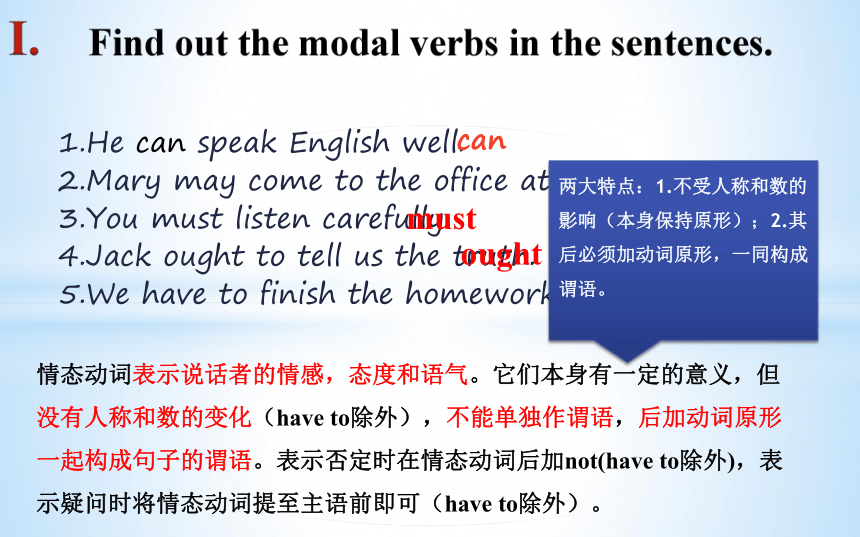

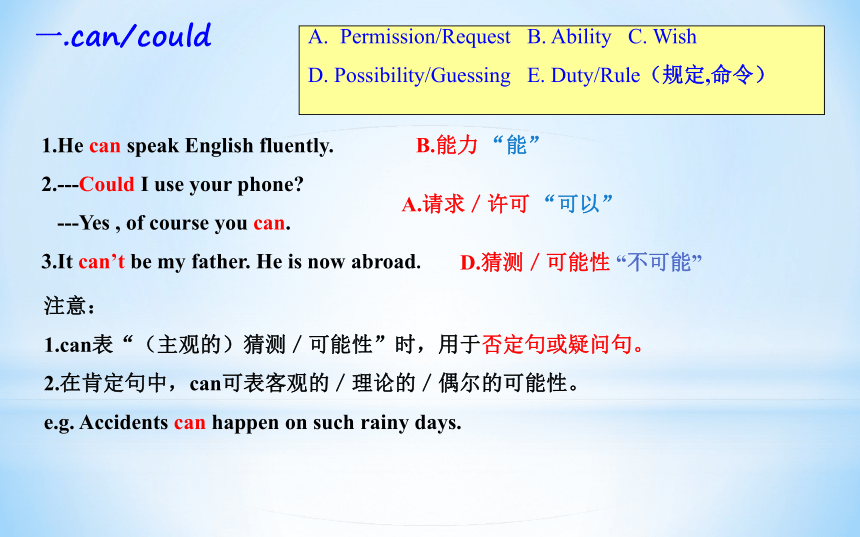
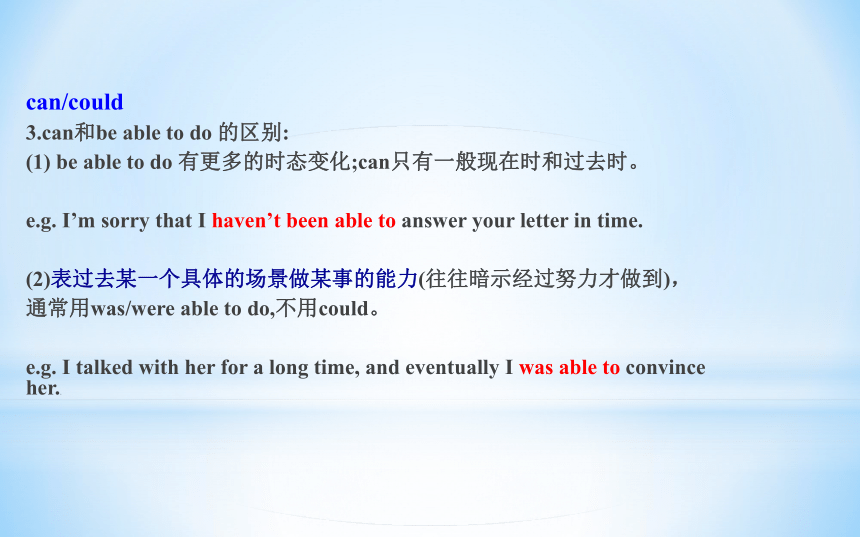

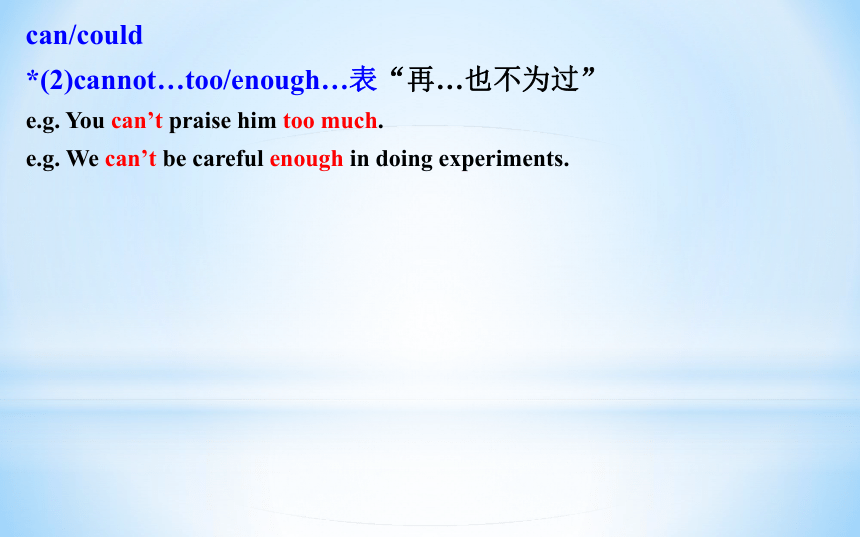
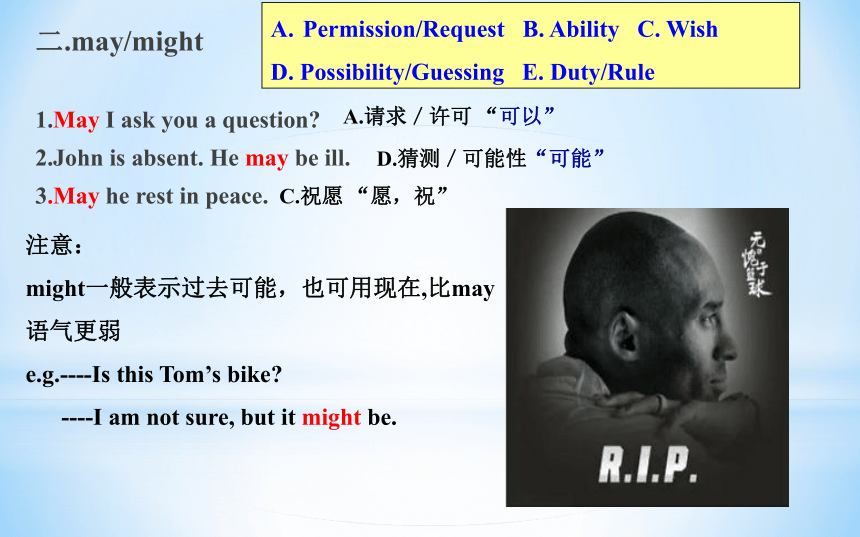
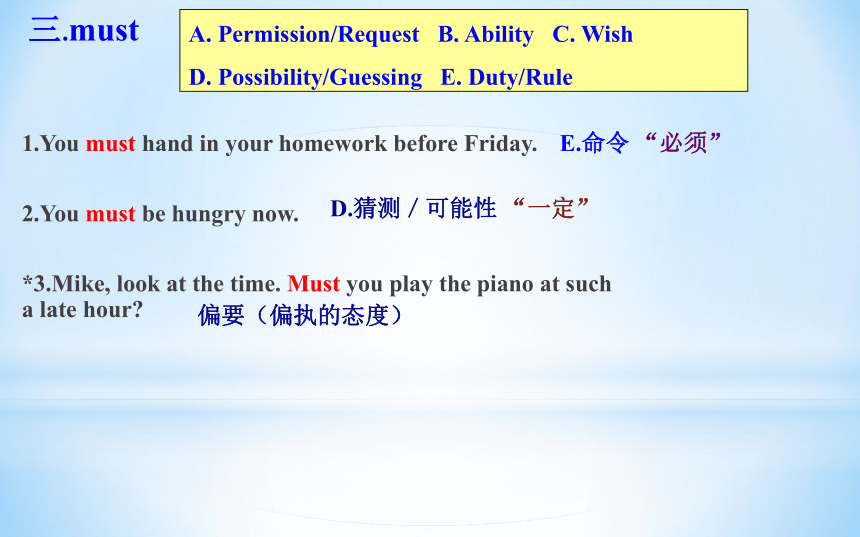
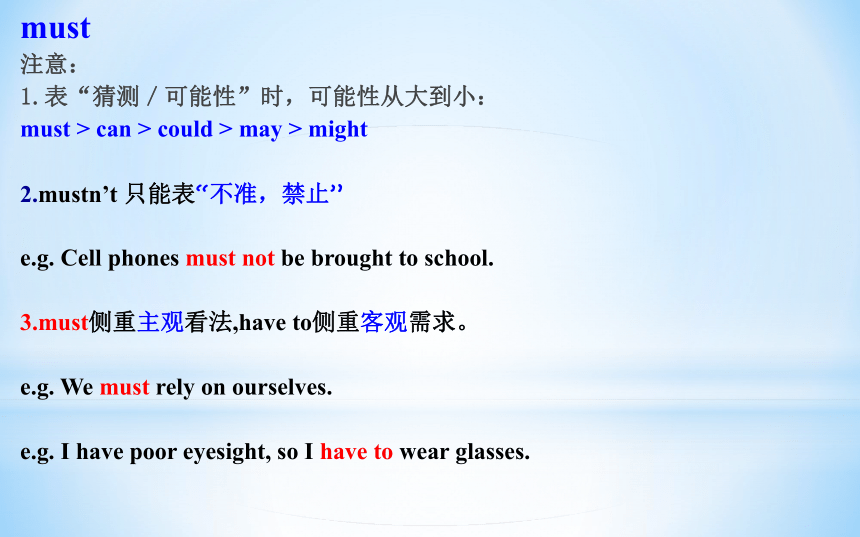
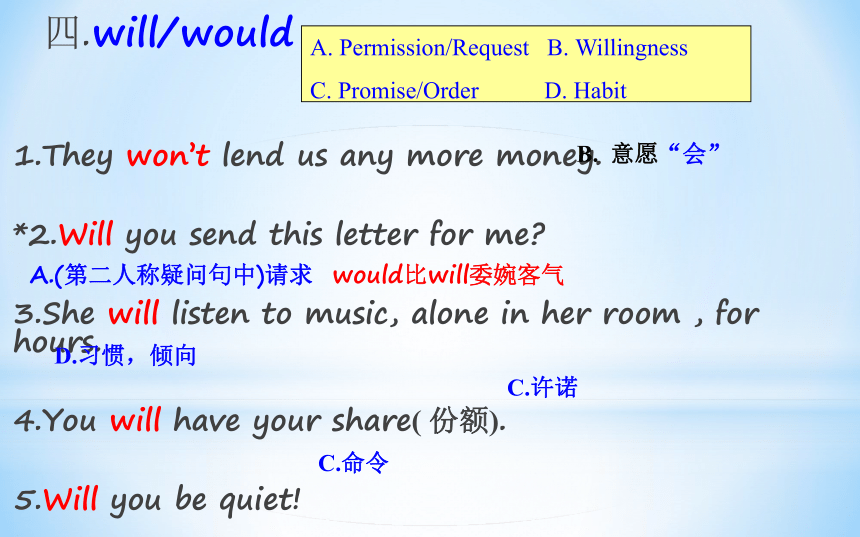
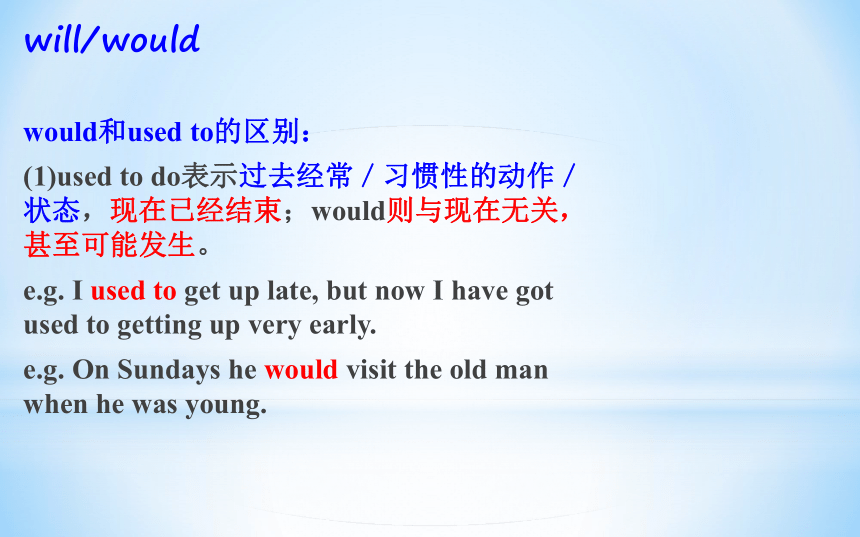
文档简介
(共40张PPT)
Grammar
人教课标版
高一 必修 3
Unit1-2
Modal verbs
1.He can speak English well.
2.Mary may come to the office at 9 am.
3.You must listen carefully.
4.Jack ought to tell us the truth.
5.We have to finish the homework everyday.
Find out the modal verbs in the sentences.
can
may
must
ought to
have to
情态动词表示说话者的情感,态度和语气。它们本身有一定的意义,但没有人称和数的变化(have to除外),不能单独作谓语,后加动词原形一起构成句子的谓语。表示否定时在情态动词后加not(have to除外),表示疑问时将情态动词提至主语前即可(have to除外)。
两大特点:1.不受人称和数的影响(本身保持原形);2.其后必须加动词原形,一同构成谓语。
常用的情态动词
一.can/could
1.He can speak English fluently.
2.---Could I use your phone?
---Yes , of course you can.
3.It can’t be my father. He is now abroad.
B.能力 “能”
A.请求/许可 “可以”
D.猜测/可能性 “不可能”
Permission/Request B. Ability C. Wish
D. Possibility/Guessing E. Duty/Rule(规定,命令)
注意:
1.can表“(主观的)猜测/可能性”时,用于否定句或疑问句。
2.在肯定句中,can可表客观的/理论的/偶尔的可能性。
e.g. Accidents can happen on such rainy days.
can/could
3.can和be able to do 的区别:
(1) be able to do 有更多的时态变化;can只有一般现在时和过去时。
e.g. I’m sorry that I haven’t been able to answer your letter in time.
(2)表过去某一个具体的场景做某事的能力(往往暗示经过努力才做到),
通常用was/were able to do,不用could。
e.g. I talked with her for a long time, and eventually I was able to convince her..
can/could
4.can 还有些习惯用法:
(1)在否定句和疑问句中表“惊讶”
e.g. How can you believe such a rumor(谣言)!
e.g. How can China build a hospital so quickly?
can/could
*(2)cannot…too/enough…表“再…也不为过”
e.g. You can’t praise him too much.
e.g. We can’t be careful enough in doing experiments.
二.may/might
1.May I ask you a question?
2.John is absent. He may be ill.
3.May he rest in peace.
Permission/Request B. Ability C. Wish
D. Possibility/Guessing E. Duty/Rule
A.请求/许可 “可以”
D.猜测/可能性“可能”
C.祝愿 “愿,祝”
注意:
might一般表示过去可能,也可用现在,比may
语气更弱
e.g.----Is this Tom’s bike?
----I am not sure, but it might be.
三.must
1.You must hand in your homework before Friday.
2.You must be hungry now.
*3.Mike, look at the time. Must you play the piano at such a late hour?
A. Permission/Request B. Ability C. Wish
D. Possibility/Guessing E. Duty/Rule
E.命令 “必须”
D.猜测/可能性 “一定”
偏要(偏执的态度)
must
注意:
1.表“猜测/可能性”时,可能性从大到小:
must > can > could > may > might
2.mustn’t 只能表“不准,禁止”
e.g. Cell phones must not be brought to school.
3.must侧重主观看法,have to侧重客观需求。
e.g. We must rely on ourselves.
e.g. I have poor eyesight, so I have to wear glasses.
四.will/would
1.They won’t lend us any more money.
*2.Will you send this letter for me?
3.She will listen to music, alone in her room , for hours.
4.You will have your share( 份额).
5.Will you be quiet!
A. Permission/Request B. Willingness
C. Promise/Order D. Habit
B. 意愿“会”
A.(第二人称疑问句中)请求 would比will委婉客气
D.习惯,倾向
C.许诺
C.命令
will/would
would和used to的区别:
(1)used to do表示过去经常/习惯性的动作/状态,现在已经结束;would则与现在无关,甚至可能发生。
e.g. I used to get up late, but now I have got used to getting up very early.
e.g. On Sundays he would visit the old man when he was young.
will/would
would和used to的区别:
(2)would可以表过去习惯性的动作。used to可表过去习惯性的动作和状态。
e.g. There would be a building at the street corner, but now it has been pulled down.
?
e.g. There used to be a building at the street corner, but now it has been pulled down.
?
will/would
Ex.选词填空:would/used to
1.He be a naughty boy and cause trouble.
2.In those days , whenever I had difficulties, I go
to Mr. Chen for help.
3.Sometimes she take a walk in the neighboring woods.
4.I get up at six in the morning , but now I can’t.
used to
would
would
used to
五.should/shall
Permission/Request B. Duty
C. Advice D. Possibility
1.The children should be taken good care of.
2.You should have no problem with reading this book.
3.You should stop worrying about it.
*4.I find it astonishing that he should be so rude to you.
B.义务,职责“应当”
D. 可能性 “按道理应该”
C.建议“应当”
表说话人愤怒、惊讶、失望等特殊情绪“竟然”
5.He asked if he should get his book tomorrow.
(第一、三人称,常用于间接引语)征求意见
shall
1.主语是第一人称,表将来
e.g. This time next week I shall be in Scotland.
2.主语是第一、三人称,疑问句,征求意见/请求
e.g. What shall we do this weekend?
3.主语是第二、三人称,陈述句,表许诺、命令、警告、威胁等
e.g. You shall get an answer from me tomorrow.
明天你将会得到我的回答。(许诺)
4.主语是第三人称,陈述句,在条约/规定/法令等文件中表义务
e.g. Candidates(考生) shall remain in their seats until all the papers have been collected.
六.need & dare
既可以做实义动词,也可以做情态动词。
1. I dare say…
2.How dare you say that to me?
3.
---Dare he go alone? ---No, he dare not.
---Does he dare to go alone? ---No , he doesn’t.
4.
---Need he do it now? ---No, he needn’t.
---Does he need to go there at once? ---Yes, he does.
(Yes, he must)
She ( dare/dares) not go there alone.
=She (dare not/doesn’t dare) to go there alone.
dare
doesn’t dare
七.ought to
1.表示责任和义务,意为“应该”
e.g. To be a popular student , we ought to be strict with ourselves.
2.表示可能性,一般指较大的可能性,意为“按道理应该”
e.g. If he started at six , he ought to be here now.
3.ought to 的否定形式为ought not to/oughtn’t to
e.g. You ought not to make this kind of mistake again.
should & ought to
两者皆可表示“应当”,主要区别如下:
1.should 侧重表达主观看法;ought to侧重表达客观情况,即法律、义务等的规定,或使自己的意见听起来像法律和义务一样有力。即ought to 语气比should重。
e.g. You should /ought to take care of the baby.
2.在疑问句中更常用should.
e.g. Should I open the window?
我可以打开窗户吗?
had better
“最好”
e.g. You had better (not) do that.
would rather
“宁愿”
e.g. I would rather die than give in.
八.had better & would rather
Summary
1.can / could / may / might / will / would / must / shall / should
2.即可作情态动词也可作实义动词need / dare
3.具有情态动词特征的短语:had better / would rather / used to / have to / ought to / be able to
1.could, would, might不一定只能表过去时,也可以表语气委婉、或不太确定的语气。
e.g. Could you pass me the salt?
e.g. I would appreciate it if you could give me a hand.
e.g. Mary might come with us tonight, but she isn’t very sure.
肯定回答要用must 或have to,否定回答要用needn’t 或don’t have to,意思是“不必”
e.g.---Must I finish the task right now?
肯:---Yes, you must/have to.
否:---No, you needn’t/don’t have to.
( 不能说No , you mustn’t)
(2)May I/we…问句的回答:
肯定回答要用can 或may,否定回答要用can’t或mustn’t.
e.g.---Might/May I watch TV now?
---Yes, you can/may.(或Yes , please do)
---No, you can’t/mustn’t.(No, you’d better not)
A
B
D
*3.情态动词表推测时应注意的几个问题:
(1)完全否定推测用can’t(不可能). mustn’t表“不准,禁止”(不能表猜测)
e.g. He can’t be Peter. Peter has gone abroad.
(2)疑问句中的推测用can提问
e.g. Can it be Tom who did it?
C
D
(3)情态动词+have done:对过去的猜测
对比:
You must be ill. I can see it from your face.
你现在一定是病了。(对现在的猜测)
You must have gone to bed late last night. Your eyes are red.
你昨晚一定很晚才去睡觉(对过去的猜测)
may/might have done
can’t/couldn’t have done
should have done
shouldn’t have done
needn’t have done
door was
B
D
C
表猜测
Exercises
can
should
have to
must
can
['dr?plit]
should
should
must
should
need
can/will
can/will
?[?ep??dem?k]
Thank you !
Grammar
人教课标版
高一 必修 3
Unit1-2
Modal verbs
1.He can speak English well.
2.Mary may come to the office at 9 am.
3.You must listen carefully.
4.Jack ought to tell us the truth.
5.We have to finish the homework everyday.
Find out the modal verbs in the sentences.
can
may
must
ought to
have to
情态动词表示说话者的情感,态度和语气。它们本身有一定的意义,但没有人称和数的变化(have to除外),不能单独作谓语,后加动词原形一起构成句子的谓语。表示否定时在情态动词后加not(have to除外),表示疑问时将情态动词提至主语前即可(have to除外)。
两大特点:1.不受人称和数的影响(本身保持原形);2.其后必须加动词原形,一同构成谓语。
常用的情态动词
一.can/could
1.He can speak English fluently.
2.---Could I use your phone?
---Yes , of course you can.
3.It can’t be my father. He is now abroad.
B.能力 “能”
A.请求/许可 “可以”
D.猜测/可能性 “不可能”
Permission/Request B. Ability C. Wish
D. Possibility/Guessing E. Duty/Rule(规定,命令)
注意:
1.can表“(主观的)猜测/可能性”时,用于否定句或疑问句。
2.在肯定句中,can可表客观的/理论的/偶尔的可能性。
e.g. Accidents can happen on such rainy days.
can/could
3.can和be able to do 的区别:
(1) be able to do 有更多的时态变化;can只有一般现在时和过去时。
e.g. I’m sorry that I haven’t been able to answer your letter in time.
(2)表过去某一个具体的场景做某事的能力(往往暗示经过努力才做到),
通常用was/were able to do,不用could。
e.g. I talked with her for a long time, and eventually I was able to convince her..
can/could
4.can 还有些习惯用法:
(1)在否定句和疑问句中表“惊讶”
e.g. How can you believe such a rumor(谣言)!
e.g. How can China build a hospital so quickly?
can/could
*(2)cannot…too/enough…表“再…也不为过”
e.g. You can’t praise him too much.
e.g. We can’t be careful enough in doing experiments.
二.may/might
1.May I ask you a question?
2.John is absent. He may be ill.
3.May he rest in peace.
Permission/Request B. Ability C. Wish
D. Possibility/Guessing E. Duty/Rule
A.请求/许可 “可以”
D.猜测/可能性“可能”
C.祝愿 “愿,祝”
注意:
might一般表示过去可能,也可用现在,比may
语气更弱
e.g.----Is this Tom’s bike?
----I am not sure, but it might be.
三.must
1.You must hand in your homework before Friday.
2.You must be hungry now.
*3.Mike, look at the time. Must you play the piano at such a late hour?
A. Permission/Request B. Ability C. Wish
D. Possibility/Guessing E. Duty/Rule
E.命令 “必须”
D.猜测/可能性 “一定”
偏要(偏执的态度)
must
注意:
1.表“猜测/可能性”时,可能性从大到小:
must > can > could > may > might
2.mustn’t 只能表“不准,禁止”
e.g. Cell phones must not be brought to school.
3.must侧重主观看法,have to侧重客观需求。
e.g. We must rely on ourselves.
e.g. I have poor eyesight, so I have to wear glasses.
四.will/would
1.They won’t lend us any more money.
*2.Will you send this letter for me?
3.She will listen to music, alone in her room , for hours.
4.You will have your share( 份额).
5.Will you be quiet!
A. Permission/Request B. Willingness
C. Promise/Order D. Habit
B. 意愿“会”
A.(第二人称疑问句中)请求 would比will委婉客气
D.习惯,倾向
C.许诺
C.命令
will/would
would和used to的区别:
(1)used to do表示过去经常/习惯性的动作/状态,现在已经结束;would则与现在无关,甚至可能发生。
e.g. I used to get up late, but now I have got used to getting up very early.
e.g. On Sundays he would visit the old man when he was young.
will/would
would和used to的区别:
(2)would可以表过去习惯性的动作。used to可表过去习惯性的动作和状态。
e.g. There would be a building at the street corner, but now it has been pulled down.
?
e.g. There used to be a building at the street corner, but now it has been pulled down.
?
will/would
Ex.选词填空:would/used to
1.He be a naughty boy and cause trouble.
2.In those days , whenever I had difficulties, I go
to Mr. Chen for help.
3.Sometimes she take a walk in the neighboring woods.
4.I get up at six in the morning , but now I can’t.
used to
would
would
used to
五.should/shall
Permission/Request B. Duty
C. Advice D. Possibility
1.The children should be taken good care of.
2.You should have no problem with reading this book.
3.You should stop worrying about it.
*4.I find it astonishing that he should be so rude to you.
B.义务,职责“应当”
D. 可能性 “按道理应该”
C.建议“应当”
表说话人愤怒、惊讶、失望等特殊情绪“竟然”
5.He asked if he should get his book tomorrow.
(第一、三人称,常用于间接引语)征求意见
shall
1.主语是第一人称,表将来
e.g. This time next week I shall be in Scotland.
2.主语是第一、三人称,疑问句,征求意见/请求
e.g. What shall we do this weekend?
3.主语是第二、三人称,陈述句,表许诺、命令、警告、威胁等
e.g. You shall get an answer from me tomorrow.
明天你将会得到我的回答。(许诺)
4.主语是第三人称,陈述句,在条约/规定/法令等文件中表义务
e.g. Candidates(考生) shall remain in their seats until all the papers have been collected.
六.need & dare
既可以做实义动词,也可以做情态动词。
1. I dare say…
2.How dare you say that to me?
3.
---Dare he go alone? ---No, he dare not.
---Does he dare to go alone? ---No , he doesn’t.
4.
---Need he do it now? ---No, he needn’t.
---Does he need to go there at once? ---Yes, he does.
(Yes, he must)
She ( dare/dares) not go there alone.
=She (dare not/doesn’t dare) to go there alone.
dare
doesn’t dare
七.ought to
1.表示责任和义务,意为“应该”
e.g. To be a popular student , we ought to be strict with ourselves.
2.表示可能性,一般指较大的可能性,意为“按道理应该”
e.g. If he started at six , he ought to be here now.
3.ought to 的否定形式为ought not to/oughtn’t to
e.g. You ought not to make this kind of mistake again.
should & ought to
两者皆可表示“应当”,主要区别如下:
1.should 侧重表达主观看法;ought to侧重表达客观情况,即法律、义务等的规定,或使自己的意见听起来像法律和义务一样有力。即ought to 语气比should重。
e.g. You should /ought to take care of the baby.
2.在疑问句中更常用should.
e.g. Should I open the window?
我可以打开窗户吗?
had better
“最好”
e.g. You had better (not) do that.
would rather
“宁愿”
e.g. I would rather die than give in.
八.had better & would rather
Summary
1.can / could / may / might / will / would / must / shall / should
2.即可作情态动词也可作实义动词need / dare
3.具有情态动词特征的短语:had better / would rather / used to / have to / ought to / be able to
1.could, would, might不一定只能表过去时,也可以表语气委婉、或不太确定的语气。
e.g. Could you pass me the salt?
e.g. I would appreciate it if you could give me a hand.
e.g. Mary might come with us tonight, but she isn’t very sure.
肯定回答要用must 或have to,否定回答要用needn’t 或don’t have to,意思是“不必”
e.g.---Must I finish the task right now?
肯:---Yes, you must/have to.
否:---No, you needn’t/don’t have to.
( 不能说No , you mustn’t)
(2)May I/we…问句的回答:
肯定回答要用can 或may,否定回答要用can’t或mustn’t.
e.g.---Might/May I watch TV now?
---Yes, you can/may.(或Yes , please do)
---No, you can’t/mustn’t.(No, you’d better not)
A
B
D
*3.情态动词表推测时应注意的几个问题:
(1)完全否定推测用can’t(不可能). mustn’t表“不准,禁止”(不能表猜测)
e.g. He can’t be Peter. Peter has gone abroad.
(2)疑问句中的推测用can提问
e.g. Can it be Tom who did it?
C
D
(3)情态动词+have done:对过去的猜测
对比:
You must be ill. I can see it from your face.
你现在一定是病了。(对现在的猜测)
You must have gone to bed late last night. Your eyes are red.
你昨晚一定很晚才去睡觉(对过去的猜测)
may/might have done
can’t/couldn’t have done
should have done
shouldn’t have done
needn’t have done
door was
B
D
C
表猜测
Exercises
can
should
have to
must
can
['dr?plit]
should
should
must
should
need
can/will
can/will
?[?ep??dem?k]
Thank you !
同课章节目录
